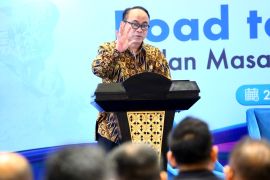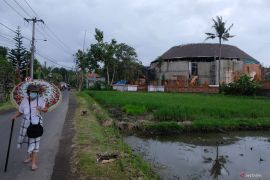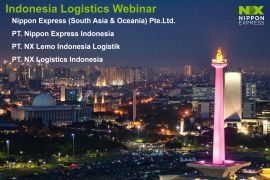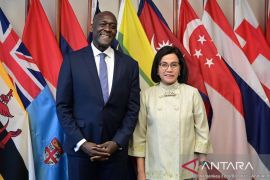Al-Shahristani also invited Indonesian businessmen to take part in open tenders, conducted every week in Iraq, where many foreign companies - from China, Europe, Korea and the U.S. - have already entered.Jakarta (ANTARA News) - The recent visit of Iraqi Deputy Prime Minister Hussain Ibrahim Saleh Al-Shahristani to Indonesia is expected to strengthen bilateral relations between Indonesia and Iraq, particularly in the economic, business and investment sectors.
Al-Shahristani invited Indonesia's state-owned and private companies to participate in the reconstruction of Iraq, such as in the development of energy, oil and gas sectors, as well as of infrastructure, most of which was destroyed after the US invasion.
"In addition to developing a petroleum and gas complex, Iraq is also rebuilding its infrastructure, such as roads, airports and harbours, and it needs the participation of foreign companies," he said.
Al-Shahristani also invited Indonesian businessmen to take part in open tenders, conducted every week in Iraq, where many foreign companies - from China, Europe, Korea and the U.S. - have already entered.
He said Indonesian investors should participate because Indonesian oil and gas companies were capable of competing with other international companies.
"Business opportunities in the energy sector are huge because Iraq is trying to increase its oil production," Yopie Hidayat, a spokesman for Indonesian Vice President Boediono, said after a meeting between Boediono and Al-Shahristani on June 25, 2012, in Jakarta.
As a lot of infrastructure construction activities are under way, Iraq has also invited Indonesian professionals from the energy, construction, finance, and logistics industries to work in the Middle Eastern country.
The Iraqi deputy prime minister has guaranteed the safety of Indonesian businessmen and professionals in view of improved security conditions in the country.
Indonesian Ambassador to Iraq Safzen Noerdin, during a presentation on Indonesia-Iraq investment opportunities, in Jakarta on July 3, 2012, said there were plenty of opportunities for Indonesia to invest in the reconstruction of Iraq, particularly because the Iraqi government gave priority to Muslim-majority nations.
"Following the US invasion, Iraq`s infrastructure has been totally damaged, so there are big opportunities [to invest] in various fields," he added.
"Iraq is familiar with the good quality products exported by Indonesia, and the Iraqi people currently need tires, soaps, spices, and other daily-use products," Safzen stated.
He said the Indonesian embassy in Iraq would also help ensure the safety and security of Indonesian businessmen.
Indonesia`s bilateral trade value with Iraq increased to US$154 million in 2011, from US$52 million in 2010.
"Indonesia could invest in the oil and gas sector and also in the development of schools, hospitals, bridges, roads, sports stadiums and markets," Safzen noted.
Iraq also wanted to develop concrete plants, tire plants, pharmaceutical companies, electronics companies and palm oil plantations, he added.
"Having sufficient experience in the agriculture and fisheries sectors, Indonesia could even help in the development of these sectors in Iraq, because the Iraqi government has allocated special funds for that purpose," the ambassador explained.
In fact, five Indonesian state-owned companies (BUMN), grouped under Indonesia Incorporated, are eyeing development projects in Iraq.
The five BUMN companies are PT Adhi Karya Tbk, PT Hutama Karya, PT PLN, PT Pertamina, and PT Wijaya Karya.
"The BUMN officials recently visited Iraq to explore cooperation possibilities," said Suryadi Mardjoeki, the head of the Oil and Gas Division of state-owned power company PLN, on June 18.
Suryadi added that he followed through the plan of the Directorate General of Oil and Gas of the ministry of energy and mineral resources to set up Indonesia Incorporated in order to contribute to Iraq`s development.
"Yesterday, we explored the possibilities of cooperation during a meeting led by the director general of oil and gas, Evita Legowo," he said through a text message.
PLN is targeting projects in which it has competence, especially in power plant operations and maintenance, while Iraq itself has also expressed interest to cooperate with Indonesia.
PT Wijaya Karya is currently carrying out a flat development project in Iraq. The company will also develop housing and school facilities, worth Rp500 billion (around US$50 million), in oil field areas.
PT Adhi Karya, which cancelled its projects in Iraq after facing problems in the war-ravaged country, is now focusing on projects in Southeast Asia.
Meanwhile, PT Pertamina is exploring offshore business possibilities in Iraq and plans to take over an Iraqi oil company later this year. The move will enable the firm to get directly involved in oil exploration in the Middle Eastern country, according to State Enterprises Minister Dahlan Iskan.
"We may acquire 10 to 20 per cent share. With a 10 per cent stake, we are already able to secure 130,000 barrels," he said at his office recently.
He explained that the step was necessary in the wake of Iraqi government`s unwillingness to hand over its oil field to Pertamina.
Pertamina president director Karen Agustiawan said the company wished to acquire a 10 percent stake in at least two fields, with a production capacity of 2.5 million and 1.8 million barrels a day, respectively. "We will soon talk to the operators," she added.
Following the acquisition, Pertamina hoped to produce 430,000 barrels a day from the two fields, she said, adding that this was a significant step to boost the energy resilience of Indonesia. Karen revealed that the acquisition in 2012 would cost Pertamina Rp10 trillion.
In 2002, Pertamina won the bid for Block 3-Western Desert, which had a reserve of 3 billion barrels, but the company stopped the project due to security issues.
Pertamina will also soon start importing crude oil directly from Iraq.
On June 27, 2012, in Jakarta, the representatives of the two countries signed a memorandum of understanding on crude oil import from Iraq.
"Iraq plans to increase its crude production from 3 million to 10 million barrels a day in four to five years` time. They are ready to meet our needs for crude. This is a mutually beneficial agreement," said Jero Wacik, the minister of energy and mineral resources.
Meanwhile, Energy and Mineral Resources Ministry oil and gas director general Evita Herawati Legowo stated that Pertamina currently imported 300,000 barrels of crude for its refineries. The crude from Iraq could also be used to meet the needs of the new refinery under construction in Plaju, South Sumatra, estimated to have a capacity of 300,000 barrels a day, she added.
Iraq produces 3 million barrels of oil per day and plans to increase the productivity to 10 million barrels per day by 2017.
"I am convinced that Iraq could become a safety valve to prevent volatility in the price of oil and meet the increasing demand of crude oil from developing countries, including Indonesia," the Iraqi deputy prime minister said during a lecture on "Iraq`s Contribution to the World Facing the Global Challenges and Crisis" at Pertamina Building on June 26.
According to Al-Shahristani, Iraq has a proven oil reserve of 143 billion barrels, or 11 percent of the world`s total reserves, and a gas reserve of 3.5 trillion cubic metres.
Out of the 78 oil fields in Iraq, nine are classified as "super-big", with reserves of more than 5 billion barrels, while there are 23 oil fields with reserves reaching one billion barrels - all located in south-eastern Iraq. (*)
Reporter: Fardah
Editor: Heru Purwanto
Copyright © ANTARA 2012











